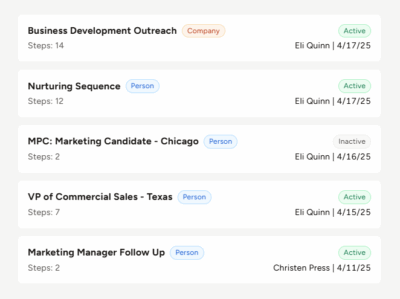Identifying red flags in candidates early in the recruitment process is critical for agency recruiters and search consultants. Not only does it save time, but it also ensures that your reputation for delivering top-quality candidates remains intact. By closely examining a candidate’s behavior, communication, and history, recruiters can make informed decisions and reduce the risk of a bad hire.
In this blog post, we will examine actionable strategies to uncover potential issues, with practical insights to sharpen your skills in candidate evaluation.
Understanding the Importance of Early Detection
Red flags are warning signs that indicate a candidate may not be the right fit for a role or organization. These can manifest in various ways, from inconsistencies in their resume to unprofessional behavior during interviews. Identifying these red flags early prevents wasted time and resources, protects your client relationships, and upholds the integrity of the recruitment process.
Early detection is especially important for agency recruiters, whose success depends on providing clients with candidates who meet both skill and cultural fit requirements. Proactively spotting and addressing red flags ensures that only the most suitable candidates advance through the hiring funnel.
Resume Red Flags to Watch For
Gaps in Employment History
Employment gaps are among the most common red flags, but they aren’t always a dealbreaker. Candidates may have valid reasons for gaps, such as pursuing further education, caregiving responsibilities, or other personal matters. However, a lack of explanation or reluctance to discuss gaps can signal potential issues, such as job instability or difficulty maintaining employment.
When encountering gaps, consider the duration and frequency. Frequent, unexplained absences from the workforce may indicate a pattern of inconsistency. During interviews, ask open-ended questions to understand the candidate’s circumstances and assess whether their explanation aligns with their resume timeline.
Frequent Job Changes
Job-hopping—switching roles frequently without a compelling reason—can indicate a lack of commitment, difficulty adapting to workplace environments, or a tendency to leave at the first sign of challenge. While some industries, like tech or consulting, may tolerate more movement, excessive job-hopping across all fields should raise concerns.
Look for patterns in the candidate’s history. If they have consistently left roles after a few months, ask why. Candidates who cannot provide clear, logical reasons for their transitions may struggle with long-term engagement.
Overly Broad or Vague Job Descriptions
Candidates should be able to articulate their accomplishments and contributions to previous roles. Overly broad job descriptions or vague language may suggest a lack of genuine expertise or an attempt to embellish their qualifications. For example, a candidate claiming they “managed projects” without specifying the scope, results, or team size may not have the depth of experience they’re projecting.
Press candidates for details. Ask them to describe specific challenges they faced, actions they took, and results they achieved. This behavioral interviewing technique will help uncover whether their experience aligns with their claims.
Inflated Titles
Another common red flag is an inflated or inconsistent job title. Candidates who exaggerate their positions may do so to appear more qualified than they are. For instance, someone claiming to be a “Director” when their actual responsibilities align more closely with an entry-level manager’s role is likely misrepresenting their experience.
To verify titles and responsibilities, cross-check references and look for alignment between the candidate’s timeline and their claimed achievements. Subtle discrepancies may indicate a deeper issue.
Behavioral Red Flags During Interviews
Lack of Preparation
A well-prepared candidate demonstrates respect for your time and enthusiasm for the opportunity. Candidates who arrive at interviews without researching the company, role, or industry raise concerns about their professionalism and motivation. Signs of poor preparation include vague responses, an inability to discuss how their skills align with the job, or a lack of insightful questions.
Gauge a candidate’s preparation by asking targeted questions, such as, “What attracted you to this role?” or “How does this position align with your career goals?” Candidates who struggle to provide thoughtful answers may not have invested sufficient effort in their application process.
Poor Communication Skills
Effective communication is a fundamental competency in virtually all roles. Candidates who struggle to articulate their thoughts, provide rambling answers, or fail to listen actively during the conversation may lack the interpersonal skills necessary for success.
While nerves can play a role in interview performance, consistently poor communication throughout the process can indicate deeper issues. Observe their body language, tone, and clarity of expression to gauge their communication abilities.
Overemphasis on Compensation
While it’s natural for candidates to be curious about compensation, those who focus excessively on salary, bonuses, or perks—particularly in early conversations—may prioritize personal gain over the role’s responsibilities and the organization’s mission. This behavior can also signal a transactional mindset, which may not align with the company’s culture.
Address compensation concerns directly, but observe whether the candidate demonstrates genuine interest in other aspects of the role. A balanced approach—where compensation is important but not the sole focus—is generally a positive sign.
Negative Remarks About Previous Employers
Candidates who speak negatively about former employers or colleagues risk appearing unprofessional and difficult to work with. While there are valid situations where constructive criticism is warranted, excessive complaints or a lack of accountability often indicate poor interpersonal skills or unresolved conflicts.
Encourage candidates to frame their experiences positively. For example, ask, “What did you learn from that situation?” or “How would you handle a similar challenge differently in the future?” This approach reveals whether they can reflect constructively on past experiences.
Reference Check Red Flags
Hesitation to Provide References
Candidates who are reluctant to share references or delay providing contact information may have something to hide. While privacy concerns are valid, a complete refusal to comply with standard reference checks should raise concerns about their transparency and credibility.
Clarify your reference-checking process upfront to ease candidate concerns, but be cautious if they consistently avoid the subject. Candidates confident in their past performance are usually willing to provide references promptly.
Generic or Evasive Feedback from References
During reference checks, pay attention to the tone and specificity of responses. Generic statements like, “They were fine,” or evasive feedback suggest that the reference may be withholding information. Conversely, overly glowing praise without examples may indicate a biased or coached response.
Ask detailed questions during reference calls. For example, inquire about specific accomplishments, challenges the candidate faced, and their working relationships with colleagues. Cross-reference this feedback with the candidate’s resume and interview responses for consistency.
Red Flags in Cultural Fit
Misalignment with Company Values
Cultural fit is a critical component of successful placements. Candidates whose values, work styles, or attitudes clash with the company’s culture are unlikely to thrive long-term. For example, a highly independent candidate may struggle in a collaborative environment, or a risk-averse individual may falter in a fast-paced startup.
To assess cultural fit, ask situational questions that reveal the candidate’s preferences and values. For instance, “Tell me about a time when you disagreed with a team decision. How did you handle it?” Their response will offer insight into their adaptability and alignment with the client’s culture.
Resistance to Feedback
Adaptability and a willingness to learn are hallmarks of successful employees. Candidates who appear defensive or dismissive when given constructive feedback during the recruitment process may struggle to grow within an organization. For example, if a candidate becomes visibly uncomfortable or argumentative when asked to clarify a point, it may signal an inability to handle criticism effectively.
Assess their openness to feedback by presenting hypothetical scenarios. For example, ask, “How would you handle receiving constructive feedback from a manager or peer?” Look for responses that demonstrate self-awareness and a growth mindset.
Navigating Ethical and Integrity Concerns
Dishonesty in Applications
Honesty is non-negotiable in professional settings. Candidates who provide false information on their resumes, exaggerate their achievements, or omit key details compromise their credibility. Common examples of dishonesty include fabricated degrees, exaggerated job titles, and inaccurate dates of employment.
Verify all critical information through background checks and direct verification with previous employers. Even minor discrepancies should be addressed directly with the candidate to gauge their response and ensure transparency.
Inappropriate Social Media Presence
In today’s digital age, a candidate’s online presence can provide valuable insights into their character and judgment. Inappropriate content, such as offensive posts, unprofessional photos, or controversial comments, may indicate a lack of maturity or poor decision-making skills.
Review publicly available social media profiles to ensure candidates align with the values of the organization. If concerns arise, discuss them openly with the candidate to understand their perspective and assess whether the behavior is likely to impact their professional performance.
Trusting Your Intuition
Recognizing Subtle Warning Signs
As experienced recruiters, intuition often plays a critical role in identifying red flags. Subtle warning signs, such as inconsistent storytelling, overly rehearsed answers, or a lack of enthusiasm, can provide valuable clues about a candidate’s suitability. Trusting your instincts, combined with objective evidence, helps build a comprehensive evaluation of the candidate.
Balancing Skepticism with Fairness
While it’s essential to remain vigilant for red flags, avoid letting skepticism overshadow fairness. Candidates are human and may occasionally falter under the pressure of the recruitment process. Strive to balance empathy with critical analysis to ensure a fair and accurate assessment.
Spotting red flags in candidates early requires a combination of keen observation, structured evaluation, and thorough verification. By examining resumes, conducting behavioral interviews, and leveraging reference checks, agency recruiters and search consultants can identify potential issues and ensure they present only the most qualified candidates to their clients. Developing these skills not only enhances your effectiveness but also solidifies your reputation as a trusted partner in the hiring process.








